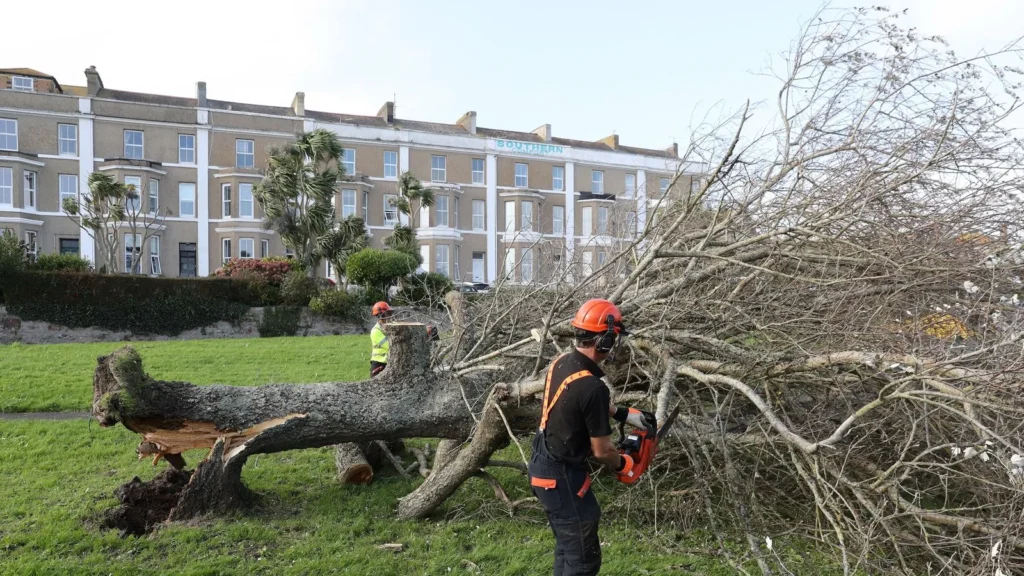Trees add beauty, shade, and value to our gardens and landscapes. But like any living thing, they need proper care to stay healthy and safe. Ignoring early signs of trouble can lead to serious risks, from falling branches to tree disease spreading across your property. That’s where professional tree surgery comes in.
If you’re based in Poole, Bournemouth, or anywhere in Dorset, knowing when to call a skilled tree surgeon can make the difference between saving a tree and facing costly removal. In this guide, we’ll walk you through the common signs your trees may need attention and why hiring a local expert is so important.
What is the Tree Surgery Procedure?
Tree surgery is a specialised practice that involves a range of techniques to improve tree health, structure, and safety. While often confused with basic pruning, it is far more advanced. A qualified tree surgeon carries out precise work such as:
- Crown reduction and thinning – reshaping trees for safety and light balance.
- Pollarding – cutting back trees to promote controlled regrowth.
- Stump removal – grinding or removing roots after a tree has been felled.
- Deadwood removal – clearing unsafe or decayed branches.
- Tree felling – safely removing a tree when necessary.
Local demand for services like tree surgery Poole is common, as many gardens in Dorset feature mature trees that require professional management.
Common Signs Your Tree May Need Tree Surgery
1. Unsafe or Overhanging Branches
Branches that extend over roofs, driveways, or neighbouring gardens are a common concern. In strong winds, they can break without warning. Professional pruning keeps your property safe while maintaining the natural balance of the tree.
2. Dead or Brittle Wood
If you notice cracked or hollow branches, this is often a sign of decay. Deadwood can fall at any time, posing a serious danger. Removing it early prevents accidents and protects the healthier parts of the tree.
3. Excessive Leaning
While some trees naturally grow at an angle, a sudden lean may indicate root damage or soil instability. A professional assessment is essential to decide whether corrective work or removal is required.
4. Fungal Growth or Disease
Mushrooms or unusual growths at the base often suggest internal decay. Left untreated, this can spread to other trees and plants. A tree care specialist can identify the problem and recommend the right treatment.
5. Dense Canopies and Lack of Light
If your garden feels darker than usual, it could be due to a crowded canopy. Thinning the crown allows more light to reach lawns and plants below, creating a healthier balance in your outdoor space.
Protect the Long-Term Health of Your Trees with Professional Tree Surgery
Beyond immediate risks, tree surgery is about protecting the lifespan of your trees. Correct pruning prevents disease spread, encourages healthy growth, and allows more light and airflow through the canopy.
A qualified tree specialist will also check for hidden issues such as pest damage or root instability. This proactive approach saves money in the long run and helps your trees flourish.
When is Emergency Tree Care Necessary?
Sometimes tree problems can’t wait. Emergency care is required when there’s an immediate risk to people, property, or surrounding landscapes. These urgent situations often arise without warning, especially after severe weather.
- Trees or branches damaged by storms
- Leaning trees threatening buildings or power lines
- Sudden splits or cracks in the trunk
In moments like these, calling a qualified tree surgeon is essential. Trained professionals can respond quickly, handle dangerous situations safely, and restore peace of mind for homeowners across Poole, Bournemouth, and Dorset.
What is the British Standard for Tree Surgery?
Professional tree work in the UK follows BS3998:2010 – Tree Work Recommendations. This standard outlines best practices for pruning, felling, and long-term tree management.
By hiring a professional, you ensure that all work is completed legally, safely, and with respect to the tree’s health. Whether you’re searching for tree surgery Bournemouth, always check that your chosen team adheres to these British standards.
What is the Best Time of Year for Tree Surgery?
Choosing the right season for tree surgery can make a big difference to both the health of your trees and the results of the work. While trees can be maintained year-round, some periods are better suited for certain procedures.
- Winter – Dormant season, ideal for most pruning.
- Spring/Summer – Lighter pruning to encourage growth.
- Autumn – Removal of deadwood before winter storms.
Working with a local professional ensures the timing is tailored to your garden. In Dorset, where coastal weather can be unpredictable, expert advice helps you schedule tree care at the safest and most effective time of year.
What is the Difference Between an Arborist and a Tree Surgeon?
Although the terms are often used as if they mean the same thing, there are key differences between an arborist and a tree surgeon. Understanding these roles helps you choose the right professional for your tree care needs.
- Arborist – Specialises in the science of tree care, offering consultancy and detailed assessments.
- Tree Surgeon – Focuses on the practical side, carrying out the physical work.
In practice, many modern professionals combine both skills, providing both expert advice and hands-on work. Whether you call them arborists or tree surgeons, the most important factor is their training, experience, and commitment to recognised safety standards.
Get Professional Help from Tree Rebral
Tree Rebral, is specialise in tree surgery across Bournemouth, Poole, and Dorset. Our experienced tree surgeons provide everything from routine pruning to complex dismantling and emergency call-outs.
Why choose Tree Rebral?
- Fully qualified, insured, and BS3998-compliant.
- Local knowledge of Dorset’s tree species and landscape.
- Modern equipment and safe working practices.
- Transparent quotes and customer-focused service.
Contact Tree Rebral for Emergency Tree Services
When storms strike or sudden damage occurs, quick action is essential. The emergency response team at Tree Rebral is equipped to handle urgent situations across Poole, Bournemouth, and Dorset.
Whether it’s a fallen branch, a dangerous lean, or damage near property, we provide fast, professional solutions that restore safety without compromising the health of your landscape.
FAQs
What does a tree surgeon do?
A tree surgeon carries out practical work such as pruning, crown reduction, felling, and stump grinding. Their role ensures trees remain safe, healthy, and visually pleasing.
When to call a tree surgeon?
Call a tree surgeon if your tree shows signs of disease, decay, dead branches, or poses a safety risk. Emergency services are essential after storms.
How does tree surgery work?
Tree surgery involves assessing the tree, choosing the right technique (e.g., pruning, felling), and carrying out work using safe climbing and cutting methods.
What does tree surgery involve?
It can involve crown reduction, thinning, shaping, or full removal, depending on the tree’s condition. Each task is carefully planned for minimal impact.
Why is tree surgery so expensive?
Tree surgery requires specialist skills, safety training, insurance, and equipment. Costs reflect the complexity, risk, and time involved in each job.
Conclusion
Tree surgery is essential for keeping your garden safe, beautiful, and thriving. From spotting the early signs of decay to handling storm damage, a professional tree surgeon ensures that your trees receive the right care at the right time.
If you’re in Poole, Bournemouth, or Dorset, don’t wait until a small issue becomes a major hazard. With expert guidance, your trees can remain healthy and secure for generations to come.

